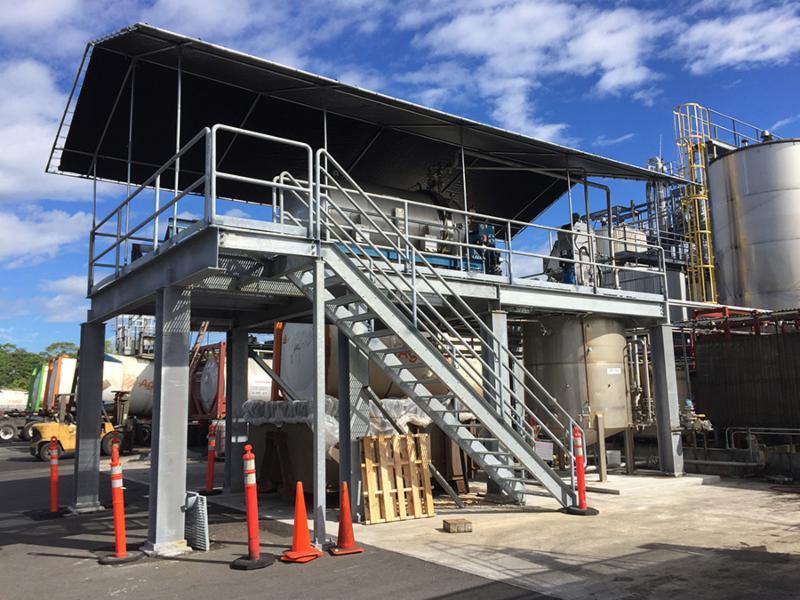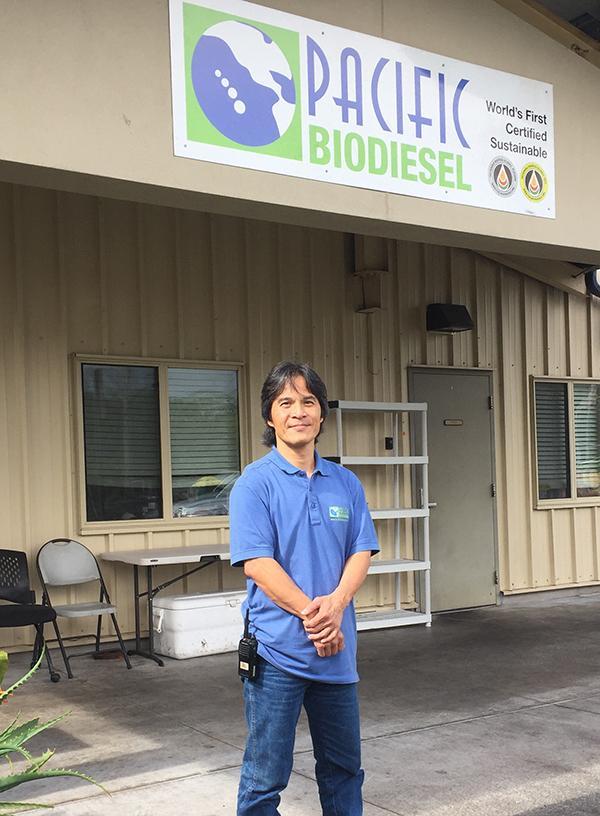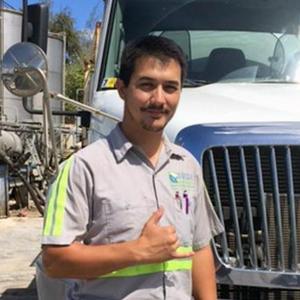Pacific Biodiesel eyes California as federal, local support wanes




Photo: Pacific Biodiesel
April 18, 2019
BY Ron Kotrba
Hawaii-based Pacific Biodiesel has long prided itself on producing biodiesel from local resources within the petroleum-dependent archipelago and supplying the renewable fuel back to its community. But as the U.S. biodiesel sector tries to push forward in an unsupportive federal environment, producers like Pacific Biodiesel are finding it necessary to be creative and operate outside their norm to continue operations. As such, Jenna Long, Pacific Biodiesel’s director of operations, told Biodiesel Magazine that the company is considering shipping its biodiesel to California to take advantage of the state’s lucrative Low Carbon Fuel Standard. “Nothing is definitive, but we’re working toward it as an option,” she said.
Long cited the lack of support on national, state and local levels as the drivers to consider shipping its fuel to California.
Federally, the biodiesel industry is enduring the longest lapse of its $1 per gallon tax credit in the incentive’s history. The tax credit expired Dec. 31, 2017. In addition, the Trump administration’s EPA has repeatedly attempted to stall or curtail biodiesel and advanced biofuel growth under the Renewable Fuel Standard, its latest bump from 2.1 billion to 2.43 billion gallons in biomass-based diesel’s 2020 RVO notwithstanding. Furthermore, the unprecedented granting of small refinery exemptions has eroded demand for biofuels and is playing a significant role in depressing RIN credit prices.
“And there’s no mandate for biodiesel here in Hawaii,” Long said. “Our state on-road tax exemption, which has been a nice [16-cent] discount, has been helpful but it is being challenged this year. Legislators put forth a bill to take it away. It went through the House and Senate and finally died off, but it is odd to see challenges to the [little] support we are currently getting. And we don’t see anything new coming to replace it if it is [rescinded]. And on the county level, they’re trying to take away a road tax discount. What we’re trying to point out to others is, if the state is not supportive, then we will look to other states that are.”
Pacific Biodiesel has made significant capital and personnel investments over the years in its oil recycling facility on Oahu and its biodiesel production plant on the big island of Hawaii, including recent improvements.
The Sand Island facility on Oahu recently completed extensive upgrades designed to maximize efficiency and improve the recycling capabilities of trap grease while increasing renewable energy usage. Components of the new system, which processes brown grease collected from across the island, include a centrifuge system, a diffused air filtration (DAF) unit with cooling tower, and a generator run on B100 from its plant on Hawaii Island. Once the solids and liquids are separated in the decanter, the liquid layer enters the centrifuge where the oil is separated from the water. The oil is sent to Pacific Biodiesel’s fuel refinery on Hawaii Island where it is processed into biodiesel. The remaining wastewater is put through the DAF system, removing impurities and adjusting the pH levels to meet compliance standards.
Advertisement
While the B100-fueled Cummins 200-kilowatt generator currently powers the centrifuge system, the company says it has the capacity to run the entire Oahu plant as future improvements unfold.
To oversee the facility’s operations, Brian Leighton, a seven-year employee of Pacific Biodiesel, has been promoted to plant manager.
"Brian has long been a part of our dedicated team on Oahu and we’re excited that he’s taking on this important position,” Long said. “We’re confident that his expertise and our new equipment will help our Oahu facility reach new heights."
Leighton said the new system allows the plant to maximize its feedstock recovery while continuing to ensure the remaining waste meets or exceeds approved standards. “We continue to reduce our carbon footprint while exploring additional alternatives, efficiencies and methods to further our goals of zero-waste to benefit the city, county and state of Hawaii in the future,” Leighton said.
According to Long, up to 25 percent of feedstock supplied to Pacific Biodiesel’s refinery on Hawaii Island comes from its recycling facility on Oahu. Much of the remainder is shipped from the mainland, which is why the installation of a new pretreatment system at its biodiesel refinery was so important.
“It’s so important for us to be able to remediate or fix any off-spec feedstock in-house,” Long said. “Once it arrives here from California or Washington, we can’t just ship it back if it’s off-spec, so our ability to remediate rather than just shove off-spec product through our plant is very important. It also gives us the ability to go after more contaminated, lower-priced material. That’s our next big push, to secure more off-spec feedstock.”
The company recently completed testing of its new pretreatment system. Newly promoted plant manager Al Leung said “All systems are go.”
Advertisement
The pretreatment system incorporates a filter press with nonsilica diatomaceous earth (DE), which filters out poly materials from highly degraded feedstock. After an agitator mixes the heated feedstock with the DE, it passes through the filter press where the DE captures all the poly. The cleansed oil is transferred to the refinery for biodiesel production, leaving a dry filter cake. Pacific Biodiesel is looking at possible options to convert this cake to a soil amendment or fertilizer.
“It’s a testament to the dedication of all the team members who have put the pretreatment project together and made it happen,” Leung said. “Because of all their hard work, we have taken a giant step forward.”
Of Leung’s recent promotion to plant manager, Long said, “Al brings a fair-minded leadership style to our Big Island facility that we all appreciate. He works very hard to help his teams to overcome challenges both big and small.”
Thus far, all of Pacific Biodiesel’s more than 5 MMgy of biodiesel produced has been supplied in state, with three-quarters of it going to power production through contracts with Hawaiian Electric Co. and the rest to local transportation markets.
“Our contracts with Hawaiian Electric are very important to us,” Long said. “They’re our biggest contract, but it’s flexible and allows us to send them more or less if both parties agree.”
Long said Pacific Biodiesel has been asked in the past about shipping its biodiesel to California, even by California Air Resources Board. “Our mission has always been to produce fuel in Hawaii and sell it in Hawaii,” she told Biodiesel Magazine. “We’ve tried hard to do that.”
Related Stories
IAG and Microsoft are extending their 2023 co-funded purchase agreement for SAF by five years. The SAF used under the agreement will be produced by Phillips 66’s Humberside refinery and LanzaJet’s facility in the U.S.
U.S. exports of biodiesel and biodiesel blends of B30 or greater fell to 7,849.6 metric tons in February, according to data released by the USDA Foreign Agricultural Service on April 3. Biodiesel imports were at 21,964.9 metric tons for the month.
Neste and DB Schenker, a logistics service provider, have collaborated to work towards expanding DB Schenker’s adoption of Neste MY Renewable Diesel in Asia-Pacific. DB Schenker trialed the fuel from December 2024 to February 2025 in Singapore.
The International Air Transport Association has launched the Sustainable Aviation Fuel (SAF) Registry with its release to the Civil Aviation Decarbonization Organization. The registry is now live and under CADO management.
Varo Energy, a European energy company based in Switzerland, on March 31 announced an agreement to acquire Preem, a Sweden-based petroleum and biofuels company that is developing additional renewable diesel and SAF capacity.
Upcoming Events










